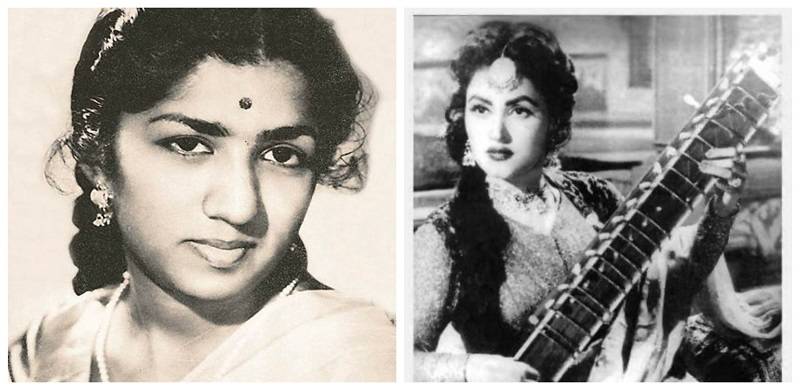
The musical kokila (nightingale) Lata Mangeshkar is among us no more. As long as music lives, she will remain the soul and sound of music. From my early childhood till this day, more than six decades, she has captivated my heart.
Lata Mangeshkar was the catch of Master Ghulam Haider (1908-1953), a dentist by profession and a class composer by choice, who moved to Pakistan shortly after Partition. Partition certainly caused a great division among the music fraternity of the Indian sub-continent; Noor Jehan moved to Pakistan, too. But Lata was lucky enough to have a galaxy of composers at her disposal, diamond-cutters who shaped her destiny in view of their deep understanding of human sentiment, which was immersed in the lyrics, timbre and accompanying instrumentation.
But Noor Jehan was not that lucky in this respect. Although she earned name, fame and wealth in Pakistan, she lamentably never achieved the depth and quality which Lata earned. Had Madam (as Noor Jehan is known in Pakistan) remained in India, the fate of both of these vocalists would have been entirely different.
Conclusively, it will not be out of place to say that the name of Lata Mangeshkar will be continue to be commemorated till there is music in the air.
Amongst hundreds of melodies, here are a few of her solo classics for your perusal:
I will mention here two of my top favourites - Mushkil hai bahut mushil (Mahal 1949) and Tu chanda mein chandni (Reshmaaur Shera 1971 ) - music for which was composed by Khemchand Prakash and Jaidev, respectively.
Lata's notable composers include Khemchand Prakash, Anil Biswas, Husnalal Bhagatram, Naushad, C. Rachandra, Roshan, Vasant Desai, Ghulam Mohd, Jaidev, Shanker Jaikishan, Salil Chowdhary, S.D. Burman and Hansraj Behl – to name just a few.
Lata Mangeshkar was the catch of Master Ghulam Haider (1908-1953), a dentist by profession and a class composer by choice, who moved to Pakistan shortly after Partition. Partition certainly caused a great division among the music fraternity of the Indian sub-continent; Noor Jehan moved to Pakistan, too. But Lata was lucky enough to have a galaxy of composers at her disposal, diamond-cutters who shaped her destiny in view of their deep understanding of human sentiment, which was immersed in the lyrics, timbre and accompanying instrumentation.
But Noor Jehan was not that lucky in this respect. Although she earned name, fame and wealth in Pakistan, she lamentably never achieved the depth and quality which Lata earned. Had Madam (as Noor Jehan is known in Pakistan) remained in India, the fate of both of these vocalists would have been entirely different.
Conclusively, it will not be out of place to say that the name of Lata Mangeshkar will be continue to be commemorated till there is music in the air.
Amongst hundreds of melodies, here are a few of her solo classics for your perusal:
- Wo din kahan gaye bata (Tarana-Anil Biswas),
- Ye zindagi usee ki hai ( Anarkali- C.Ramchandra),
- Jo mein janati bisrat hain sanyiyaan (Shabab- Naushad),
- Sajan ki galiaan chhod chale (Bazar- Shyam Sunder),
- Jo dil mein khushi ban kar aaye (Badi Behan- Husnalal Bagatram),
- Wo to chale gaye aye din (Sangdil- Sajjad Hussain),
- Aree main ro prem diwani (Nau Bahar- Roshan),
- Rasik balma (Chori Chori- Shankar Jaikishan)
- Aye mere watan ke logo (a non-film song composed by C.Ramcandra).
I will mention here two of my top favourites - Mushkil hai bahut mushil (Mahal 1949) and Tu chanda mein chandni (Reshmaaur Shera 1971 ) - music for which was composed by Khemchand Prakash and Jaidev, respectively.
Lata's notable composers include Khemchand Prakash, Anil Biswas, Husnalal Bhagatram, Naushad, C. Rachandra, Roshan, Vasant Desai, Ghulam Mohd, Jaidev, Shanker Jaikishan, Salil Chowdhary, S.D. Burman and Hansraj Behl – to name just a few.

